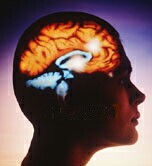Pretreatment connectivity can predict response to psychotherapy in major depressive disorder
MONDAY, Feb. 9, 2015 (HealthDay News) — Resting-state functional brain connectivity magnetic resonance imaging (rs-fcMRI) can predict response to psychotherapy in major depressive disorder (MDD), according to a study published online Feb. 4 in Neuropsychopharmacology.
Andrew Crowther, from the University of North Carolina at Chapel Hill, and colleagues examined whether rs-fcMRI predicted response to an empirically validated psychotherapy modality (Behavioral Activation Treatment for Depression). rs-fcMRI scans were performed on 23 unmedicated outpatients with MDD and 20 matched nondepressed controls. The MDD group subsequently received an average of 12 psychotherapy sessions.
The researchers observed a mean change in Beck Depression Inventory-II scores of 12.04 points, which was clinically meaningful. The MDD group was characterized at baseline by relative hyperconnectivity of multiple regions with precuneus, anterior insula, dorsal anterior cingulate cortex (dACC), and left dorsolateral prefrontal cortex seeds, and by relative hypoconnectivity with intraparietal sulcus, anterior insula, and dACC seeds. The magnitude of pretreatment MDD symptoms was predicted by connectivity of the precuneus with the left middle temporal gyrus and connectivity of the dACC with the parahippocampal gyrus. Pretreatment connectivity of the right insula with the right middle temporal gyrus and the left intraparietal sulcus with the orbital frontal cortex predicted response to psychotherapy in the MDD group.
“These results add to the nascent body of literature investigating pretreatment rs-fcMRI predictors of antidepressant treatment response and is the first study to examine rs-fcMRI predictors of response to psychotherapy,” the authors write.
Copyright © 2015 HealthDay. All rights reserved.








